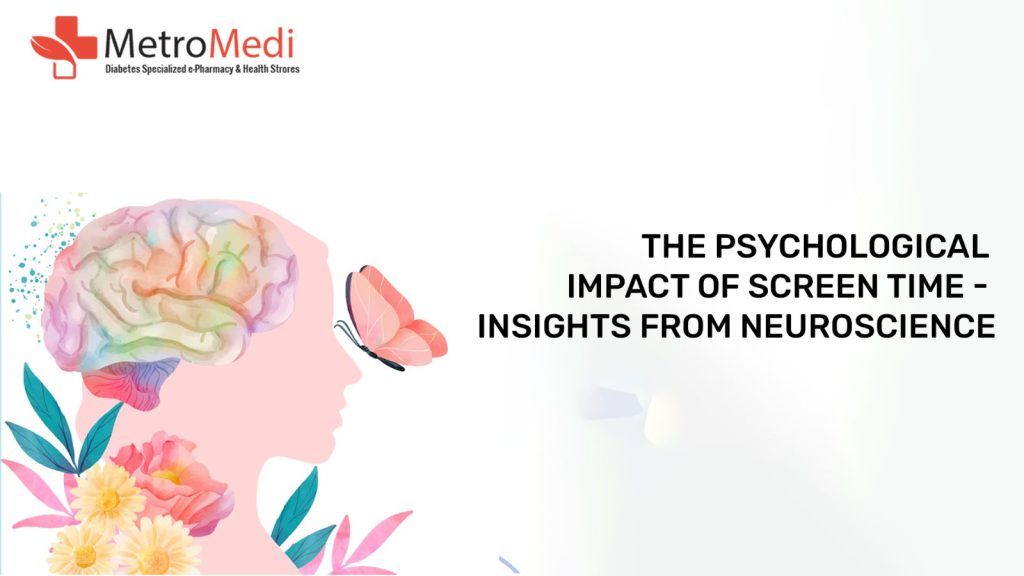
In today’s digital age, screens are an integral part of daily life. From smartphones and tablets to computers and televisions, we are constantly interacting with digital devices. While these technologies bring many benefits, they also pose significant challenges, particularly concerning our mental health. This article explores the psychological impact of screen time through the lens of neuroscience, shedding light on how excessive use of digital devices affects our brains and behaviour, and how online psychological counselling and online mental health counselling can help address these challenges.
Understanding Screen Time and Its Prevalence
Screen time refers to the amount of time spent using devices with screens such as computers, smartphones, tablets, and televisions. The rise of digital media has led to increased screen time across all age groups. According to recent studies, adults spend an average of 10 hours a day on screens, while children and teenagers can clock up to 7-9 hours daily.
The Neuroscience of Screen Time
Neuroscience provides valuable insights into how screen time affects the brain. Here are some key findings:
- Brain Plasticity and Development:
- Children and Adolescents: During childhood and adolescence, the brain undergoes significant development. Excessive screen time can interfere with this process, affecting cognitive development, attention span, and social skills. Studies have shown that high screen time can lead to structural changes in the brain regions associated with language, cognition, and emotional processing.
- Adults: While the adult brain is more developed, it remains plastic and susceptible to changes. Prolonged screen use can impact brain plasticity, leading to difficulties in concentration, memory, and emotional regulation.
- Dopamine and Reward System:
- Instant Gratification: Digital devices, especially social media and video games, provide instant gratification through likes, comments, and rewards. This stimulates the release of dopamine, a neurotransmitter associated with pleasure and reward. Over time, the brain becomes conditioned to seek this instant gratification, leading to addictive behaviours and reduced patience for tasks that require sustained effort.
- Blue Light Exposure:
- Sleep Disruption: Screens emit blue light, which can interfere with the production of melatonin, the hormone responsible for regulating sleep. Disrupted sleep patterns can lead to a range of psychological issues, including increased stress, anxiety, and depression.
Psychological Effects of Screen Time
The impact of excessive screen time on mental health is profound. Here are some of the key psychological effects:
- Anxiety and Depression:
- Social Media: Constant exposure to curated images and posts on social media can lead to feelings of inadequacy, low self-esteem, and social anxiety. The fear of missing out (FOMO) exacerbates these feelings, contributing to higher rates of anxiety and depression.
- Overstimulation: The constant bombardment of information and notifications can overwhelm the brain, leading to chronic stress and anxiety.
For those experiencing these issues, free online counselling for anxiety can provide crucial support and guidance, offering a convenient way to address mental health concerns without leaving home.
- Attention and Focus:
- Multitasking Myth: While many believe they are proficient multitaskers, the reality is that constant switching between tasks (such as checking emails while watching a video) reduces attention span and cognitive performance. This fragmented attention can impair the ability to focus on a single task, affecting productivity and learning.
- Digital ADD: Some researchers suggest that excessive screen time can contribute to attention deficit disorder-like symptoms, making it difficult for individuals to maintain sustained attention.
- Social Isolation:
- Reduced Face-to-Face Interaction: While digital communication can connect us across distances, it often comes at the expense of face-to-face interactions. Reduced physical socialization can lead to feelings of loneliness and social isolation, which are linked to a range of mental health issues.
Strategies to Mitigate Negative Effects
To mitigate the negative psychological impact of screen time, consider the following strategies:
- Set Boundaries:
- Limit Screen Time: Establish specific times for screen use and adhere to them. Use apps and settings that track and limit screen time, especially for social media and entertainment.
- Screen-Free Zones: Create screen-free zones in your home, such as the bedroom or dining area, to encourage device-free activities and interactions.
- Prioritize Sleep:
- Night Mode: Use night mode settings on devices to reduce blue light exposure in the evening. Aim to turn off screens at least an hour before bedtime to promote better sleep.
- Consistent Sleep Schedule: Maintain a consistent sleep schedule to regulate your body’s internal clock and improve overall sleep quality.
- Encourage Physical and Social Activities:
- Outdoor Activities: Engage in outdoor activities and exercise regularly to reduce the time spent on screens and improve physical and mental health.
- Face-to-Face Interaction: Prioritize in-person social interactions to build and maintain meaningful relationships.
- Mindful Use of Technology:
- Purposeful Screen Time: Use screens mindfully and with intention. Focus on using digital devices for productive and educational purposes rather than mindless scrolling.
- Digital Detox: Periodically take breaks from digital devices to reset and recharge. This can help reduce dependency and improve mental well-being.
Additionally, online counselling services can provide tools and strategies to manage screen time effectively, supporting mental health and well-being.
Conclusion
The psychological impact of screen time is a growing concern in our increasingly digital world. By understanding the neuroscience behind how screens affect our brains and adopting strategies to manage screen time, we can mitigate the negative effects and promote healthier, more balanced lives. Mindful and intentional use of technology can help us harness its benefits while protecting our mental health and well-being. If you find yourself struggling with the psychological effects of screen time, consider seeking help from online psychological counselling or online mental health counselling services. These resources offer accessible support to help you navigate the challenges of the digital age and maintain mental health.
